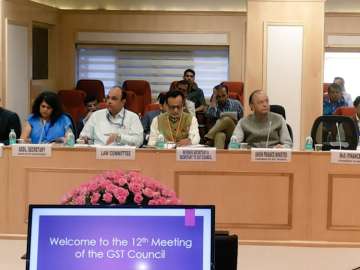GST Council clears all five draft bills, cess on demerit goods capped at 15 pc
GST Council today approved the remaining two draft bills -- UTGST and SGST – thus clearing the way for rollout of Goods and Service Tax by July 1.

The GST Council on Thursday approved the remaining two draft bills -- UTGST (Union Territory GST) and SGST (state GST) – thus clearing the way for rollout of Goods and Service Tax by July 1.
With the approval of UTGST and SGST, all the five enabling draft bills stand approved.
"The 12th Council meeting approved UTGST and SGST today. Officers had already done the groundwork, The drafts were already circulated. In the past meetings, the Council has already approved CGST (Central GST), IGST (Integrated GST) and Compensation drafts," Finance Minister Arun Jaitley, also the chairman of the GST Council, told reporters here.
The panel at its last meeting had approved the final draft of central GST (C-GST) and integrated GST (I-GST) laws.
The supporting S-GST and UT-GST legislations together with the GST Compensation Law will go to the Cabinet for a formal nod before they are presented in Parliament in the ongoing Budget session that ends on April 12.
The government is hoping the C-GST, I-GST, UT-GST and the GST Compensation laws will be approved in the current session of Parliament and state legislatures will soon clear the S-GST bills so that the new indirect tax regime can be rolled out from July 1.
The SGST draft law will have to be approved by the legislative assemblies of Delhi and Puducherry.
The UTGST draft law is for the union territories like Andaman and Nicobar Islands, Lakshadweep, Daman and Diu and Dadra and Nagar Haveli, which do not have legislative assemblies.
The new indirect tax regime also has nine set of rules and regulations, out of which the Council has already approved five -- registration, payment, refunds, invoices and returns.
"Four other rules - composition, valuation, input tax credit transitions - require a formal approval of the Council," Jaitley said adding the next meeting will be held on March 31.
GST Council caps cess on demerit goods at 15 pc
The Council also put a cap of 15 per cent cess on top of the peak GST rate of 28 per cent to be levied on luxury goods and aerated drinks.
The actual cess on demerit goods, which will help create a corpus for compensating states for any loss of revenue from GST implementation in the first five years, may be lower than the cap as the Council has kept a "little" headroom for future exigencies, Jaitley said.
Giving an example, he said if a luxury car at present commands a total tax of 40 per cent, under the new indirect tax regime, a GST of 28 per cent plus 12 per cent cess would be levied to keep the tax incidence at the same level.
The 15 per cent cess cap would apply on luxury cars and aerated drinks. On pan masala, the cess has been capped at 135 per cent ad valorem.
Tobacco cess will be capped at a mixture of Rs 4,170 per 1,000 sticks or ad valorem of 290 per cent. Cess on coal would be at Rs 400 per ton. No decision has been taken to levy cess on bidis as of now, an official said.
Jaitley said the GST Council will meet again on March 31 to approve rules after which fitting goods and services in the four-slab tax structure of 5, 12, 18 and 28 per cent will be taken up.
After March 31, the Council will take up the exercise of fitment of various commodities in the GST tax slabs - 5 per cent, 12 per cent, 15 per cent and 28 per cent, he added.
The officials have already started the fitment process, which will be put up for discussion and approval before the Council.
(With agencies)